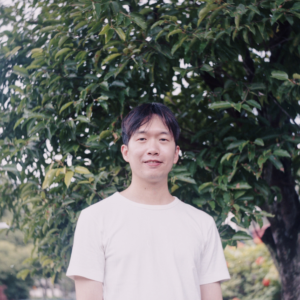
In this creative commission, writer and arts organiser Daryl Qilin Yam relays his experience of writing, listening to live music, making playlists and watching the world move around him.
Daryl takes us on a journey starting at a concert where he wants to hide in the shadows, considering whether or not he enjoyed the experience of listening to live music, and ending with him writing about writing, peering over his dad’s shoulder to watch him scroll through TikTok. We share in his reflections on how we may collaborate (or work alone) on our writing, how sharing, curating and appreciating music binds us, and how the paradox of loneliness and solidarity in writing can be seen in various other forms, primarily music.
Daryl produced this commission during a 2022 virtual residency with NCW, generously supported by National Arts Council of Singapore. Read on to discover his piece.
Solitude / Fortitude
Just the other night I was at a concert I couldn’t quite decide how I felt about. When I messaged my boyfriend about it, long after I’d left the venue and had supper with my friends and was already making my way back home, he asked if I enjoyed it, as one is wont to ask very naturally about anything vaguely cultural, and I knew in that moment that enjoyment was really beside the point at a concert like that. It was really about the experience. It wasn’t about whether or not you liked it, please; it was about whether or not you accepted it, its essential aesthetic enterprise, and whether or not it fulfilled to meet its own aims.
So many things about the concert… pertained towards an unspoken artistic ideal, this idea of community that performance-making so often relies on
Unfortunately for me, I’d neglected to scan the QR code with my phone to download the concert’s digital pamphlet prior to walking into the theatre, so I didn’t have any access to any sort of write-up about the programme. All I had, really, was what I had managed to encounter: a stage set designed to resemble an archipelago of separate islets, on which each of the six musicians performed. And because there were no seats, it was immediately understood that the audience would be made to function as a kind of shifting, primordial sea, free to move around and in between the performers, in response to whatever would unfold over the next 60 minutes. And yes, people did move, on the night I had attended this concert: some moved quickly, darting between whoever was performing the hardest at any point over the hour; some moved very slowly, like jellyfish, minding their own bodies, while others shifted their bodies to whatever rhythm they could discern, but ultimately also drifting about the space, again quite like jellyfish. One person in front of me lay down on the floor for a good minute or two, while I mostly kept to myself, against the foam wall, happy to press my hand against its soft, cushiony surface. When at one point the musician I was standing behind finally took the spotlight, I had to retreat to another corner of the theatre, because I couldn’t stand the idea of people looking past the dude’s shoulder and noticing where I’d been standing the whole time. I’d much rather stay in the dark, listen in the dark. I’m at that point in my life now where I quite liked being out of the light.
Anyway: I accepted it. I don’t even know if calling it a “concert” is the right way to go about talking about it. In fact, there were so many things about the concert (whoops) that pertained towards an unspoken artistic ideal, this idea of community that performance-making so often relies on, especially in this country. There’s something deeply gratifying about having six random musicians and performers come together, deeply vibe with one another, and sonically construct a narrative (about the Anthropocene? I believe?) that eschewed words but still relied upon a common grammar, a language that I, the itinerant traveller in this foreign land, was just hearing for the first time that evening. I’d leave the event knowing that I was just as welcome to wander in and also walk away, a place that belonged to nobody except the inhabitants of this particular archipelago. That’s just the way things went about (no: go about) here.
I think enough has been said about how writing is, ultimately, a solitary endeavour.
And yet.
Once, on a programme organised by the National Centre for Writing, my fellow writers-in-residence Akshita Nanda, Crispin Rodrigues and I were asked to describe what the literary community was like in Singapore, and I like to think we gave a sufficiently comprehensive answer, one that accounts fellow writers, readers, editors, publishers, arts organisers, mentors and mentees; I even remember neglecting to mention the fact that a fair number of us were also educators, which also means that our sense of community, surely, extends to our students as well. It’s so fucking vast, the more one thinks about this — it’s not dissimilar to the literal universe, which is said to be ever-expanding — and yet none of these people matter, really, in the grand scheme of writing.
Because writing is writing. It’s what I’m doing now, at a random café in the middle of Telok Kurau, after a three-hour lunch with a novelist friend. I’m typing away on the same MacBook Pro that I’ve typed on in living rooms, dining rooms, bedrooms, common corridors, cafeterias, the occasional toilet, and far too many Starbucks outlets. Even if I am to co-write something (imagine that!) surely my writing partner and I can’t both put our hands together on the same keyboard and yammer away. Or maybe — just maybe — we can share a common document, like something on Google Drive, and hack away at the prose on our separate devices. I can just visualise the poor sentence we’re working on, growing and shortening and twisting and turning; I can hear one of us reminding the other to punctuate, yelling over when to comma, when to em-dash, when to semicolon, when to period. Of course, if any of this appeals to you, I don’t think we can be friends.
And yet: so much of the writing I enjoy also happens to be the kind of writing that connects me to my humanity, which is to say, other people. In fact, as I type this very sentence, I need to remark that right now, in a corner of this courtyard I’m presently facing, there’s a group of children running up and down the slide of this makeshift playground the property developers have erected in a corner, and in fact there’s this one very talented boy effortlessly doing cartwheels while his friends engage in a casual game of tag. The boy does one final cartwheel, just as one of the supervising adults inform the children that they have to go, and already, I can’t help myself: I’m quietly sketching out his heartbreak, his moment of abject sorrow, the intersection he’ll inevitably arrive at when the person he used to be encounters the person he’s managed to become. I’m wondering, for instance, how and when he’ll realise that he used to do that sort of thing, cartwheels.
I turned to writing as a way of salving my solitude
And yet: the act of writing cannot help but revert to loneliness, to one’s solitude. Or perhaps that is just my tendency, my bad habit. When I told my group of poet friends (community!) the title of my second novel, one of them remarked that it was clearer than day that loneliness would be the overarching theme of my work. Putting the content of my work aside, however, I can only imagine how this can only make the biopic of Daryl Qilin Yam, the author, an intensely boring one. Picture the author, please, with a laptop at the Starbucks nearest to Inokashira Park; next, picture the author alone in his Jalan Kubor office, staring at his desktop, stretching his arms; finally, picture the author at Cafe 129-11 in Yeonhui, a residential district in Seoul, his laptop open but neglected, because he has his phone in his hands, reaching out to the novelist Han Yujoo via WhatsApp. The camera on me then zooms in, as though I were in a Hong Sang-soo film, showing us in intensely sharp detail the following words that appear, letter by letter on the screen of my iPhone: “I just need human company.”
And yet: because writing is writing, what does one’s loneliness have to do with any of it? What does company have to do with one’s ability to string a sentence together? At the earlier, above-mentioned programme organised by the National Centre for Writing, I did say that, at one point, especially when I first began to write my first novel, I turned to writing as a way of salving my solitude. For me, it was both a way into and a way out of the human condition. Something that could reveal to me the shape of things. Now, six years after the publication of Kappa Quartet, I’m finally at the stage of my practice where I can look at language the way a sculptor might squint at a slab of clay, which is to say: something I might lend shape to.
And yet: at the concert last night, just before the show properly began, I spent a minute saying hi to the audience members I managed to recognise. And then I really did keep to myself.
It’s the next day. I’m in the dining room. It’s the last morning of 2022.
I’ve been trying for nearly thirty minutes to start on this paragraph but I can’t. My father’s going through a never-ending stream of TikToks on his phone and because he is the master of his domain, a) he won’t think of putting his earphones on and b) I’m not going to ask him to. I’m just going to let him live his life. I don’t have the app, but I have listened to enough podcasts to know what an FYP is, and I’m convinced his algorithm is designed to send him random videos about random encounters in random parts of China.
I’m realising that sound will always be a part of one’s life, and I’m not just saying this because I finally caught TÁR last night — I’m not waking up in the middle of the night, trying to find where the hell that metronome is ticking. When I look at where my dog is now reclining, for example, I think of the fact that the piano used to stand there. Ever since I was a kid I was made to enrol in piano classes, just because; I got on the wave and rode it till I had to repeat the Trinity Grade 5 exam, because I just couldn’t coast on practicing once or twice a week any longer. The practical at long last demanded my time, my energy, my heart, my fear of failing a test a second time, and worse — my memory. I was playing the kinds of pieces that needed me to anticipate at all times which bars were coming next, which dynamics I needed to muster, the parts of the score that would demand the most out of my ability to move my fingers and pedal whenever appropriate. And so, of course, there’s this one piece that still knows how to play in my mind from start to finish, fastened to my brain like a surgical implant. Nonetheless, at the age of 31, I’m no longer able to tell you who wrote the damn song. All I can now grasp is its movement across my memory.
Putting together my short story collection, Be Your Own Bae, is the closest I’ll ever come to being an album artist
I believe that the most tempting thing to do right now is to find my own earphones and play some music. I mean, I can do that, but it also seems appropriate that the soundtrack to this particular essay is the soundtrack not to my imagined, emotional life, but the life I’m actually living, right here, right now, writing about writing while peeking over my father’s shoulder to see what else he’s watching on TikTok. In TÁR, what struck me as particularly significant is the titular character’s relationship with music, because I find it so utterly alien to my own. The woman shapes it, trembles under it, is contorted by it, moved by it! Lydia Tár encounters it the way a person might hold onto the handlebars of a roller coaster. The only time we really see this character consume music, listening to it like everybody else, is when a new cellist to the Berliner Philharmoniker sends her a video clip, of a recital of Edward Elgar’s Cello Concerto in E minor, Op. 85. In this moment in the film, there’s a shot of Cate Blanchett’s face lit up by the screen of her laptop, and I can’t help but think: Tár’s on YouTube. How funny.
Mostly I’m on Apple Music. While I think there’s an art to putting a book together, there’s also something just as honourable and venerable about the practice of maintaining a playlist that speaks to you, the part of you that’s utterly circadian in spirit, vibrates along a very specific set of frequencies, and is desirous of being a curator in some sort of way. That playlist, for me, is one I’ve named “SOLITUDE / FORTITUDE” and have totally made public, and it begins with Lykke Li’s “Never Gonna Love Again” (I know) in 2014 and has as its latest track the 2022 reissue of “Possibility”, also by Lykke Li.
Some things literally never change.
May they never ever change.
I suppose, at this point — I can say something about how putting together my short story collection, Be Your Own Bae, is the closest I’ll ever come to being an album artist. I can also mention the fact that yes, this collection is in many ways about music, in the same way it is about film, about gay men in Singapore, and the kind of social currency hipsterdom demands of its subscribers. I can also talk about how the ambivalence I felt re: that concert at the Esplanade is probably mostly due to the fact that I’ll never know what it’s like to be part of a supergroup like that, or to make art in a way that’s indelibly interdependent on other people’s ability to make it with you. But right now I’m distracted, because I’m engrossed in the act of stroking this impossibly long toenail that my dog has on one of his paws, but also because my father’s now on a TikTok where a woman is scolding her man for eating something. I feel like so much of contemporary Chinese culture is about scolding; it’s about scolding, and shopping, and blood circulation, and watching someone make food for you. It’s about these intensely lonely but fortifying things I’ve long learnt to accept.


Daryl Qilin Yam (b. 1991) is a writer and arts organiser from Singapore. He is most recently the author of the novella Shantih Shanith Shantih (2021), shortlisted for the 2022 Singapore Literature Prize, and the novel Lovelier, Lonelier (2021), a finalist of the 2021 Epigram Books Fiction Prize. He is a co-founder of the literary non-profit Sing Lit Station.
During his residency, Daryl worked on Be Your Own Bae, a collection of interconnected short stories concerned with the lives of queer Singaporean men and the friends, family members and mentor figures that they love and look up to. Situated across Singapore, South Korea, New York City and multiple cities in Japan, the collection further threads together multiple genres and styles of writing such as speculative fiction, ekphrasis and creative autobiography.
In 2022, the National Centre for Writing offered three virtual residencies for writers from Singapore, generously supported by the National Arts Council of Singapore. The writers were Akshita Nanda, Crispin Rodrigues and Daryl Qilin Yam. Over the six months, the Singaporean writers worked on a project with a UK-based writer as mentor. They also met online with writers and translators connected with Norwich, took part in an interview for The Writing Life podcast and participated in Meet the World events. At the end of the residency, we commissioned a piece from each writer reflecting on their residency and their writing. They also contributed writing tips, like the above, and a blog for Walking Norwich. Read more here →
You may also like...
‘In the Language Slipstream’ by Crispin Rodrigues
A commission from our 2022 virtual resident on code-switching, speech acts and biracial-bilingual identity

15th February 2023
Five ways to look at writing differently
Food for thought on how to get yourself writing from Daryl Qilin Yam

15th February 2023
Embracing the everyday in your writing
Casper Rhodes-Leeder produces a poem inspired by webcams, online learning and working from home

3rd March 2021






